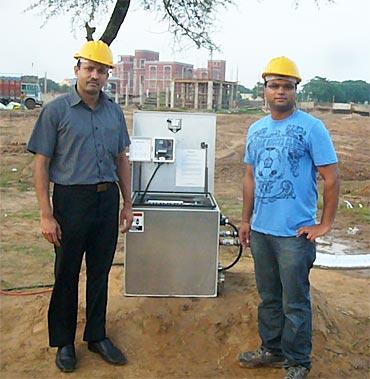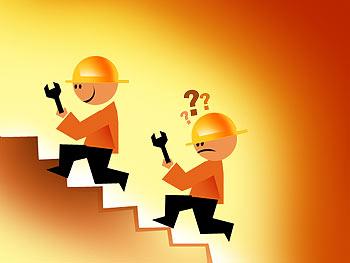Prasanna D Zore
Start-up entrepreneurs Arun Shenoy and Mandar Kaprekar share their vision and dreams of becoming a Rs 1,000 crore company in ten years.
All start-ups dream big during their incubation stage. But not all succeed.
Green India Building Systems and Services, GIBSS a start-up that offers efficient energy air cooling solutions at vastly reduced costs compared to conventional systems -- started by Arun Shenoy and Mandar Kaprekar also dream big.
Started only 15 months ago, the company has visibility of Rs 11 crore-revenue in its very first year of operations with clients like Hotel Leela, the Indian School of Business in Mohali, Hyatt in Kolkata, Raheja properties to name just a few, from the list of 20 noted names.
The two young entrepreneurs Arun, 32 and Mandar, 37 want GIBSS to become a Rs 1,000 crore company in just about ten years. Not that they don't have a plan but there are challenges as well to surmount, admit these two, who sacrificed their well-settled MNC job and a tidy pay packet so that they could realise their vision of "creating a large number of jobs and have a huge team."
Arun and Mandar spoke with Prasanna D Zore about their business model, revenue plan, the challenges they encountered and how they surmounted them and their dos and don'ts for budding entrepreneurs.
Your business model
Arun: The focus is on building systems. Buildings account for a significant consumption of energy in India. We help replace conventional building systems with energy-efficient and environment-friendly systems. Our areas of interest are air-conditioning systems, lighting and hot water systems.
A conventional air condition system in large commercial buildings will typically have an air-cooled or water-cooled chiller. These buildings also have another component called cooling tower typically seen on rooftops of large buildings. The task of cooling towers is to extract heat from the building and eject it into the atmosphere. This is a continuous loop leading to cooling in large commercial buildings.
Without going into the technicalities of how our system is superior to other conventional methods of air cooling we have designed a new system that leads to operational savings of close to 60 per cent. It is our contention that every commercial system in India has the potential to get converted to geo-thermal way of heat rejection.
Click NEXT for more
Innovative revenue model
Photographs: Rediff Archives
Is this design of heat rejection unique to your company?
Arun: Implementing this design for air-cooling requires lot of applications knowledge and experience of installing geo-thermal cooling system. Both Mandar and I have this knowledge for we have worked with western companies that implement this design. Though in India too we have a lot of commercial buildings employing geo-thermal cooling the potential is huge.
A lot of verticals that we work with, especially hotels, use boilers for heating and laundry purposes. We have come up with equipment that recovers heat. It is 10 to 25 per cent more efficient than a boiler system.
In addition to that while it produces hot water on one end, on the other end it co-generates cold water as a by-product. This cold water can easily be fed into a chiller plant for cooling purposes. This reduces the tonnage of cooling to that extent and the integrated performance of the system increases drastically leading to 70 per cent savings in operational costs.
The other important aspect of our business is lighting. Some of the hospitality clients we work with have 35,000 to 40,000 lights in their property where these lamps guzzle energy. We have developed a state-of-the-art product using LED, induction lamp and cold cathode lamp technologies that do not compromise on the decor, produces same energy output but saves eight to ten times energy than conventional lighting system.
What's your revenue model?
Mandar: There are two types of revenue models that we are able to offer today. One is obviously the capex (capital expenditure) model which requires the client to spend on capital. In case spending capital is a problem we offer them opex (operational expenditure) model where if the electricity bill of the client is say Rs 100 and if by our intervention we help them reduce it to Rs 60 then we take a part of the savings that our clients make.
The latter is a very attractive model that clients have shown interest in.
Though most of our products are innovative they have not yet been tested in India so we offer customised bank guarantee on all the products. Also, clients are concerned about their existing systems because if they are in a good condition, though relatively inefficient, its is an asset for them.
So what we do is buy it back at a fair market value and then past it on to a few small time contractors who use the equipment till it dies.
Click NEXT for more
'More than the money we were driven by the experience of creating a large entrepreneurial set up'
How did you two meet and also tell us about your academic background?
Arun: Mandar is a mechanical engineer from the University of Mumbai. He is also a graduate of IIM Bangalore. I completed my mechanical engineering from PES Institute of Technology, Bangalore and then I moved to the US where I completed my MS from Oklahoma University in the area of building systems. I completed my MBA from the Indian School of Business in 2010.
I was in the US for seven years working for Climate Masters (a pioneer in geo-thermal heat pump systems) and then moved over to world's largest manufacturer of air-conditioning systems, Trane.
I was looking for a transition to come to India to start something on my own. I didn't know Mandar then. I couldn't gather the opportunity to make that transition till Ingersoll Rand took over Trane in early 2007. When that happened a number of positions were created in India and that brought me to India to work in Ingersoll Rand.
When I came to India I joined Mandar's team who was then the regional acquisition leader at IR. And though a position was going to be created for me I didn't have enough clarity on that but I met Mandar at Trane India.
We worked on a few projects together and we developed a very good rapport. As time passed we began sharing our short-term and long-term vision and goals. Both of us wanted to experience creating a large organisation in the green domain.
For quite some time we didn't know we were going to work together. Just before leaving for ISB and my resignation from IR we had a small discussion that set the tone for our start-up company together.
For about a month after that we spent our time brainstorming over our strengths and weaknesses and what areas we should focus on. Now both of us came from a strong building system background. As I was going to a business school it gave me an opportunity to access the best mentors at ISB to put together a formal and structured business plan.
While I was doing that Mandar spent a lot of time understanding customer pain-points, product development needs in various areas and at least thrice a week we would discuss our learnings to help us focus on what the market need was.
Slowly but surely we were able to conceive a workable business plan and fortunately for us, after about nine months of discussions, we pitched the plan to ISB and they agreed to incubate us.
Then just before I graduated in April 2010 Mandar had also quit his job and took the plunge into our start-up operationally.
What kind of money did you sacrifice to make this start-up happen?
Mandar: Both of us were fairly well settled. Mandra drew a salary of Rs 30 lakh (Rs 3 million) per annum at Trane. I too skipped the placement offers at ISB where I would have drawn a similar package. But more than the money we were driven by the experience of creating a large entrepreneurial set up. Though settled, we are still going through angel investment, venture capitalist process because we didn't want to run a family business.
Apart from that we also invested all our savings and borrowed money -- about Rs 55 lakh (Rs 5.5 million) -- from friends and relatives to begin the company.
Click NEXT for more
'There were no funds, no branding available with us when we began'
By when do you think you will be able to achieve your dream of building a big organisation?
Arun: For us the definition of a large organisation means creating large number of jobs, have a huge team and in terms of revenues we want to become Rs 1,000 crore company if we can. We have seen very good traction in the last eight to ten months of our launch. This year we have a visibility of Rs 11 crore and next year we are looking at about Rs 35 crore in revenues.
By when do you think you will reach your target of Rs 1,000 crore?
Mandar: We are looking at Rs 475 crore in revenues in the fifth year from now and we are looking at a roadmap of Rs 1,000 crore in the next ten years.
You are not a tech start-up in the sense that you are not into the Internet domain. Can you tell us about your initial challenges and how did you overcome them?
Mandar: Before starting this company both Arun and I spent several of years at big corporates where the job function was very limited. Arun and I took great initiatives to understand other functions and switching roles within the organisation. But when we started our company the standpoint changed completely.
Initially, we not only had to think strategically but also get involved in small functions like going to the courier company to drop couriers.
Another change was that once we started up we stopped getting salaries. That made us cut back on our monthly spendings -- at the family as well as personal level. However, our families stood behind us and encouraged us to fulfil our ambitions.
Arun: From a business point of view our challenges were quite a few. For us convincing our customers to buy a product we were making as a small set up that we were was never going to be easy.
We spent a lot of time speaking to engineering staff of hotels and BPOs. However, the solution that we wanted to offer wouldn't reach the top decision-makers. So, we had to drastically change our approach.
This was a big challenge for us that we overcame and then came a time that we decided we are not going to talk people who are not decision makers. What we did to overcome this hurdle was made number of cold calls, sent a number of e-mails to people who mattered to seek their attention. This way we managed to touch base with over 40 five-star hotel teams in a matter of 45 days.
But then again most of them commended us for our ideas. They were not willing to give us orders. Some said they wouldn't want to consider our products at that point in time but there were a few people who showed some confidence in us and gave us an opportunity to meet them and then it all followed.
We met them, showed them what we could do for them, offered them our complete solutions that included bank guarantee, buyback and everything else that assured them that it wouldn't be a bad deal for them. Then they agreed to roll out a pilot project and once that happened they showed more confidence in us by giving us bigger orders.
Mandar: There were no funds, no branding available with us when we began. So arranging the money to execute big orders and creating brand equity for our company and products also posed another challenge that we surmounted over time.
Click NEXT for more
'half qualified as you can sometimes provide better solutions to problems at hand'
How many customers do you have today?
Arun: We have about 17 to 20 customers today. They include Leela Bangalore, Chennai and Mumbai, Courtyard Marriott in Mumbai, Kanakia Spaces, Ramada Plaza, Palm Grove Juhu, Four Seasons in Mumbai, Novotel, French Consulate, Raheha Properties, Indian School of Business in Mohali, Hyatt in Kolkata
Dos and don'ts for start-ups...
Mandar: Dos obviously are:
Have an open mind
Listen to people and your customers. Understand what they want from you. We find a lot of entrepreneurs fall in love with their idea so much that they don't heed what their customers want from them. A little bit of arrogance creeps in once the business begins to grow.
Spend a lot of time discussing with people who are well known to you. If you have a team then you can talk to your team members to seek their opinion.
Always get a layman's perspective of what you are doing and develop your solutions around that.
The biggest do I think is flexibility. When you come from a business school or corporate environment transitioning into entrepreneurship is not really a mathematical calculation. I have seen a lot of entrepreneurs who compare their existing salaries with what they used to earn as employees of big companies but that's not how one should look at entrepreneurship.
Entrepreneurship should help you gain what you actually want to do in life. It's beyond money. The focus should be on the crux of what you want to do. In our case it was experiencing and creating a large organisation. We knew that everything else, including money, would follow. So, I think one should have the flexibility to quickly adapt from corporate environment to entrepreneurial set up is a must do.
I think it is also important to be humble if you find small successes. Because if you sustain these small victories only then will you be able to achieve big in life.
Don'ts...
Mandar: No entrepreneur or start-up company should be complacent. If you want to achieve your aims there should be no room for complacency.
Big successes at the beginning of your start-up journey can make you complacent. Thankfully, Arun and I wake each other up when something like that is likely to happen. We certainly don't want to be arrogant by saying that we never got complacent. There were some moments when we were so happy that we forgot what we actually wanted to do. While I think it is important to celebrate small successes they should end in the evening.
The other don't is not to take things for granted and be judgmental about others.
Don't hide any problems from your team whether big or small as they could provide solutions and perspectives that will really help your business. Many a times they contribute out of the box ideas that never occur to you. Just because one comes from a business school does not make the person a know-all. People half qualified as you can sometimes provide better solutions to problems at hand.
Your advice to young entrepreneurs...
Arun: It's crucial to discuss your ideas and how you plan to execute it with your mentors and people in the field to get absolute clarity of thoughts before you begin.






Comment
article